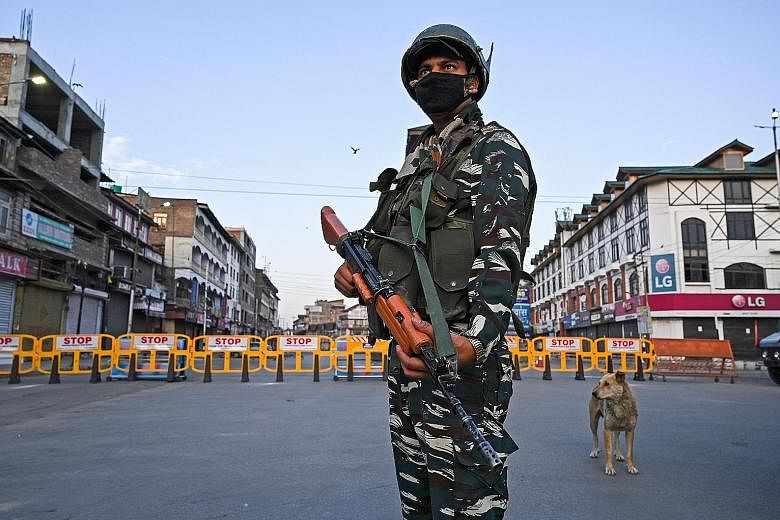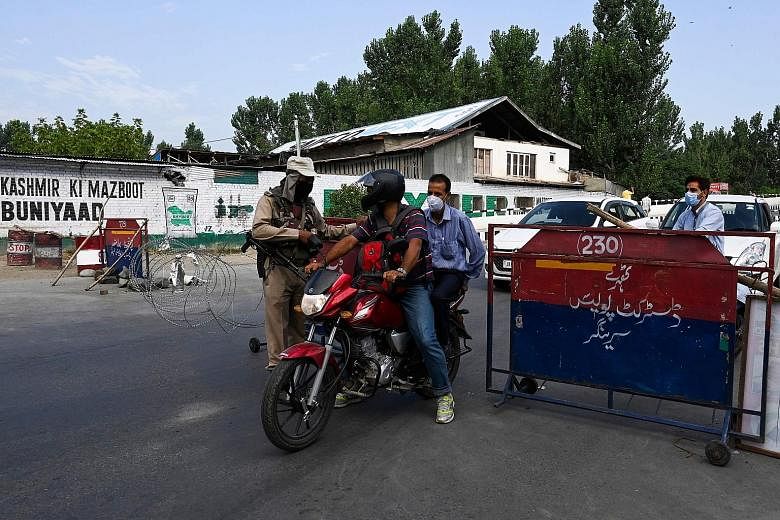The Indian territory of Jammu and Kashmir is in an economic crash, with an administration at a standstill, after a year of curbs which saw its special autonomous status revoked and federal rule imposed.
The coronavirus pandemic has made things worse, as Covid-19 restrictions add to lockdowns which have been a feature in the territory for almost the whole year.
Yesterday, thousands of Indian troops fanned out across Kashmir and surrounding villages to impose a curfew - a day before the one-year anniversary of federal rule.
This is the latest restriction in the region, which has suffered the longest Internet blackout in any democratic country as well as a raft of alleged human rights abuses.
A year ago today, India's Home Minister divided the country's only Muslim-majority state into two federal territories and scrapped its special autonomy.
Many parts of Jammu and Kashmir remain under lockdown. The Kashmir Chamber of Commerce and Industry last month estimated economic losses in the past year at 400 billion rupees (S$7.3 billion), with almost 100,000 jobs lost.
Tourism, a mainstay of the economy, has been hit hard. Agriculture, horticulture and transport have also suffered.
"Whatever businesses survived the lockdown, the pandemic has destroyed. Nobody purchases anything. Businesses are bankrupted and unpaid bank loans have piled up. Small traders have closed shop," said Mr Yaseen Khan, president of Kashmir's Traders and Manufacturer's Federation.
Mr Ram Madhav, the national general secretary of the ruling Bharatiya Janata Party, attributed the economic crash to the Kashmir Valley becoming "inaccessible during winter", and the pandemic.
The administration is at a standstill. A February government document shows recruitment had yet to start for more than 84,000 jobs.
Kashmir's lockdown, unlike those in the pandemic-struck world, comes with prolonged curbs on phone and Internet access.
The government has slowly expanded access, first to telephone calls, then select websites and, now, broadband and 2G mobile Internet, but high-speed Internet is still blocked. In May, India's Supreme Court left the issue of restoring Internet access to an executive committee.
-
KASHMIR'S 365 DAYS UNDER LOCKDOWN - IN NUMBERS
-
437
Number of people detained, as of March.
84k
Number of government job vacancies.
400b
Amount in rupees (S$7.3 billion) that the economy has lost.
13
Number of months schools were shut.
2G
Internet speed available.
118
Number of militants killed between January and June.
Mr G. N. Var, president of the Kashmir private schools' association, said schools have been shut for over 13 months now. He called it "a lock-up, not a lockdown".
"Outside Kashmir, schools closed due to Covid-19 can teach online. But we are struggling to find modern software and gadgets that work on 2G Internet. It takes three hours to upload and download a lesson. Our children are depressed and really falling behind. It's creating an irreparable education gap," he said.
The drawn-out Internet curbs have devastated healthcare too. Patients under lockdown cannot send doctors their medical reports and healthcare workers cannot attend online meetings.
On July 29, the government extended the restrictions on 4G Internet to Aug 19, citing its misuse in terror activities.
A July report by academics, former judges, bureaucrats and military officers said the 11 months of lockdown had seen an "across-the-board violation of human rights".
Since last August, the authorities have arrested thousands of people, including all the state's leading politicians. As of March, 437 people were still detained under the state's Public Safety Act, which allows preventive detention without charge or trial for up to two years.
-
What happened a year ago
-
On Aug 5 last year, the Indian government scrapped the special autonomy powers of Jammu and Kashmir, its northern-most and only Muslim-majority state. It also split the state into two federally governed territories: Jammu and Kashmir, and Ladakh.
Home Minister Amit Shah announced in Parliament that Jammu and Kashmir's special status, guaranteed under Article 370 of the Constitution, had blocked growth, hindered democracy, and generated corruption. Abrogation of Article 370 had been a campaign promise of the ruling Bharatiya Janata Party, which espouses Hindu nationalism.
A day before the announcement in Parliament, the central government imposed severe restrictions on movement and communications in Jammu and Kashmir. Those restrictions were partially lifted only when the coronavirus pandemic hit early this year.
Rohini Mohan
Journalists in Kashmir say they face increased hostility and pressure. The Editors Guild of India has described the use of an anti-terror law against two journalists as a "misuse of power" meant "to strike terror into journalists".
The authorities justify the restrictions as necessary for national security. They say the number of locals recruited by armed groups has fallen by 48 per cent from the previous year, and that militancy in South Kashmir has almost ended. A senior police official has said that 118 militants were killed between January and June.
But security experts point to Kashmir's history of upheavals after severe military crackdowns. Some of the young men killed recently had joined militant groups only this year. Former police chief A. M. Watali warned that recruitment could actually rise under the fury over Indian rule and concerns about forced cultural change.
These concerns are amplified by new domicile rules announced in May, amid the pandemic. The rules allow more people regarded as outsiders, who did not qualify to buy land in Kashmir for almost a century, to do so.
More than 370,000 people got domicile certificates in a month, including those who have studied or lived in the region for some years. Many Kashmiri Muslims fear an influx of people from outside the region could deprive them of property, education and employment.
Meanwhile, the border face-off between India and China in parts of Ladakh, the second distinct territory carved out of Jammu and Kashmir state, is unresolved, raising geopolitical stakes in the region.


